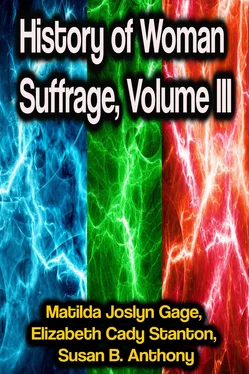The Rev. J. G. Holland, the Tupper of our American literature, thanks his Creator that woman has no specialty. She was called into being for man's happiness and interest—his helpmeet—to wait and watch his movements, to second his endeavors, to fight the hard battle of life behind him whose brain may be dizzy with excess, whose limbs may be paralyzed, or if sound in body, may be without aim or ambition, without plans or projects, destitute of executive ability or good judgment in the business affairs of life. And such sentimentalists, after demoralizing women with their twaddle, discourage our demand for the right of suffrage by pointing us to the fact that the majority of women are indifferent to this movement in their behalf. Suppose they are; have not the masses of all oppressed classes been apathetic and indifferent until partial success crowned the enthusiasm of the few? Carl Schurz would not have been exiled from his native land could he have roused the majority of his countrymen to the same love of liberty which burned in his own soul. Were his dreams of freedom less real because the stolid masses were not awake to their significance? Shall a soul that accepts martyrdom for a principle be told he is sacrificing himself to a shadow because the multitude can neither see nor appreciate the idea?
I do not feel like rejoicing over any privileges already granted to my sex, until all our rights are conceded and secured and the principle of equality recognized and proclaimed, for every step that brings us to a more equal plane with man but makes us more keenly feel the loss of those rights we are still denied—more susceptible to the insults of his assumptions and usurpations of power. As I sum up the indignities toward women, as illustrated by recent judicial decisions—denied the right to vote, denied the right to practice in the Supreme Court, denied jury trial—I feel the degradation of sex more bitterly than I did on that July 19, 1848, and never more than in listening to your speech in Philadelphia on the Fourth of July, our nation's centennial birthday, remembering that neither years nor wisdom, brave words nor noble deeds, could secure political honor or call forth national homage for women. Let it be remembered by our daughters in future generations that Lucretia Mott, in the eighty-fourth year of her age, asked permission, as the representative woman of this great movement for the enfranchisement of her sex, to present at the centennial celebration of our national liberties, Woman's Declaration of Rights, and was refused! This was the "respectful consideration" vouchsafed American women at the close of the first century of our national life.
May we now safely prophesy justice, liberty, equality for our daughters ere another centennial birthday shall dawn upon us!
Elizabeth Cady Stanton.
Sincerely yours,
Detroit, July 17, 1876.
To Lucretia Mott, Elizabeth Cady Stanton, Mary Ann McClintock and daughters, Amy Post, and all associated with them and myself in the first Woman's Rights Convention, held in Seneca Falls, N. Y., July 19, 1848, as well as to our later and present associates, Greeting:
Not able to be with you in your celebration of the nineteenth, I will yet give evidence that I prize your remembrance of our first assemblage and of our earliest work. That is, and will ever be as the present is a memorable year; and may this be memorable too for the same reason, a brave step in advance for human freedom. I would that it could be a conclusive step in legislation for the political freedom of the women of the nation. For it is only in harmony with reason and experience to predict that the men as well as the women of the near future will rejoice if this centennial year is thus marked and glorified by so grand a deed.
We may well congratulate each other and have satisfaction in knowing that we have changed the public sentiment and the laws of many States by our advocacy and labors. We also know that while helping the growth of our own souls, we have set many women thinking and reading on this vital question, who in turn have discussed it in private and public, and thus inspired others. So that at this present time few who have examined can deny our claim. But we are grateful to remember many women who needed no arguments, whose clear insight and reason, pronounced in the outset that a woman's soul was as well worth saving as a man's; that her independence and free choice are as necessary and as valuable to the public virtue and welfare; who saw and still see in both, equal children of a Father who loves and protects all.
Men do not need to be convinced of the righteousness of entire freedom for us; they have long been convinced of its justice; they confess that it is only expediency which makes them withhold that which they profess is precious to them. We await only an awakened conscience and an enlarged statesmanship.
I bid you and the women of the republic God-speed, and close in the language of one who went before us, Mary Wollstonecraft, who did so much in a thoughtless age to bring both men and women back to virtue and religion. She says: "Contending for the rights of woman, my main argument is built on this simple principle, that if she be not prepared by education to become the companion of man, she will stop the progress of knowledge and virtue; for truth must be common to all or it will be inefficacious with respect to its influence in general practice. And how can woman be expected to coöperate unless she know why she ought to be virtuous; unless freedom strengthen her reason till she comprehends her duty and sees in what manner it is connected with her real good? If children are to be educated to understand the true principle of patriotism, their mother must be a patriot; and the love of mankind from which an orderly train of virtues spring, can only be produced by considering the moral and civil interests of mankind; but the education and situation of woman at present, shuts her out from such investigations."
With the greatest possible interest in your celebration and deliberations, and assuring you that I shall be with you in thought and spirit, I am most earnestly and cordially yours,
Catharine A. F. Stebbins.
Rochester, N. Y., June 27, 1876.
My Dear Susan Anthony: I thank thee most deeply for the assurance of a welcome to your deliberative councils in our country's centennial year, to reannounce our oft-repeated protest against bondage to tyrant law. Most holy cause! Woman's equality, why so long denied?... I was ready at the first tap of the drum that sounded from that hub of our country, Seneca Falls, in 1848, calling for an assembly of men and women to set forth and remonstrate against the legal usurpation of our rights.... I cannot think of anything that would give me as much pleasure as to be able to meet with you at this time. I am exceedingly glad that you appreciate the blessings of frequent visits and wise counsel from our beloved and venerated pioneer, Lucretia Mott. I hope her health and strength will enable her to see and enjoy the triumphant victory of this work, and I wish you all the blessings of happiness that belong to all good workers, and my love to them all as if named.
Amy Post.
Pomo, Mendocino Co., California, June 26, 1876.
July 4, 1776, our revolutionary fathers—in convention assembled—declared their independence of the mother country; solemnly asserted the divine right of self-government and its relation to constituted authority. With liberty their shibboleth, the colonies triumphed in their long and fierce struggle with the mother country, and established an independent government. They adopted a "bill of rights" embodying their ideal of a free government.
With singular inconsistency almost their first act, while it secured to one-half the people of the body politic the right to tax and govern themselves, subjected the other half to the very oppression which had culminated in the rebellion of the colonies, "taxation without representation," and the inflictions of an authority to which they had not given their consent. The constitutional provision which enfranchised the male population of the new State and secured to it self-governing rights, disfranchised its women, and eventuated in a tyrannical use of power, which, exercised by husbands, fathers, and brothers, is infinitely more intolerable than the despotic acts of a foreign ruler.
Читать дальше












